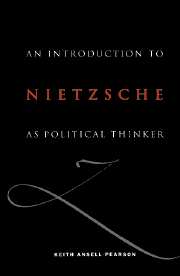Book contents
- Frontmatter
- Contents
- Acknowledgements
- Note on the texts and abbreviations
- Chronology of Nietzsche's life
- Introduction
- A note on Nietzsche and liberalism
- I THE QUESTION OF NIETZSCHE
- II ANCIENTS AND MODERNS
- 3 Nietzsche and the Greeks: culture versus politics
- 4 Nietzsche on modern politics
- III MAN AND OVERMAN
- IV THE QUESTION OF NIETZSCHE NOW
- Notes
- Bibliography
- Guide to further reading
- Index
3 - Nietzsche and the Greeks: culture versus politics
Published online by Cambridge University Press: 10 November 2009
- Frontmatter
- Contents
- Acknowledgements
- Note on the texts and abbreviations
- Chronology of Nietzsche's life
- Introduction
- A note on Nietzsche and liberalism
- I THE QUESTION OF NIETZSCHE
- II ANCIENTS AND MODERNS
- 3 Nietzsche and the Greeks: culture versus politics
- 4 Nietzsche on modern politics
- III MAN AND OVERMAN
- IV THE QUESTION OF NIETZSCHE NOW
- Notes
- Bibliography
- Guide to further reading
- Index
Summary
INTRODUCTION
Nietzsche's early writings (1871–76), include The Birth of Tragedy, the Untimely Meditations, and two unpublished essays, The Greek State (1871) and Homer's Contest (1872). The essay on the Greek state was written during the time that Nietzsche was aso engaged on his first major book, The Birth of Tragedy, which is generally assumed to have nothing to say on politics. However, a consideration of this posthumously published essay shows that the theory of art and culture that Nietzsche puts forward in the Birth of Tragedy rests on a particular conception of the political realm. In it we find a clear expression of Nietzsche's distinct political theory, with its emphasis on political life as a means to the production of great human beings and culture. For Nietzsche, modern politics is based on the delusion that it is possible to establish universal concord and justice on earth. He condemns as futile all attempts to ameliorate the human lot through modern political means.
GREEK TRAGEDY AND CULTURE
Nietzsche intended his first published work, The Birth of Tragedy (1872), to be a contribution to the young ‘science of aesthetics’. The development of art is bound up with ‘the Apollonian and Dionysian duality’ (BT 1). It is through two art deities, sculpture and music respectively, that the Greeks, according to Nietzsche, disclose the deep mysteries of artistic production. Apollo represents the dream experience; he is the ‘shining one’, the god of light, who provides the ‘beautiful illusion’ by which life is made worth living once we have looked deep into the abyss.
- Type
- Chapter
- Information
- An Introduction to Nietzsche as Political ThinkerThe Perfect Nihilist, pp. 63 - 82Publisher: Cambridge University PressPrint publication year: 1994



